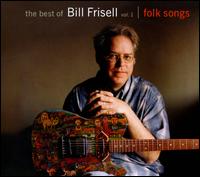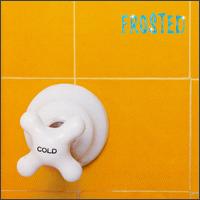Avant-guitarist Bill Frisell has been churning out records forever and they are a pretty varied bunch, from jazz chop filled experimental rock to the prettiest acoustic fripperies. The Best of Bill Frisell Vol.1: Folk Songs (2009) covers material he recorded between 1989 and 2002 and compiles some of his easiest to listen to work. Frisell's standard low-key experimental jazz elements are toned right down to leave his intuitive but extremely smart interpretations of American folksong and rural songwriting. Rarely accompanied, it's down to his guitar work to carry everything but as an accomplished musician it all sounds pretty easy for him to get this stuff right first time. There are some original tunes but a lot of the album centres on his readings of traditional songs and tunes by Hank Williams and the Carter Family. It's lovely stuff, unchallenging as a listen (which isn't something that you can say about a lot of Frisell's records) and demonstrative of the fact that sometimes it's the quieter, less showy performers who can come up with the best output.
Possibly the compiling of this side of his work led to his album Disfarmer (2009), a lengthy record, written to accompany an exhibition of the work of the depression-era photographer. It's a truly lovely record, often sounding like a soundtrack to any number of modern readings of the old West, and it's telling that it can create such an all-enveloping atmosphere with so little effort. It's all very stripped down, guitar, bass, fiddle and occasional pedal steel and mandolin, but it's mostly about Frisell's guitar work, both writing and performing. Again, there are a very covers of pieces by other country musicians, but this is country music in a very old sense, all instrumental and sparse and with a keen focus on atmosphere rather than big tunes. Further away from Frisell's usual jazz chops than ever, Disfarmer is a really beautiful series of sketches of tunes rather than an album proper, but it's perfect as such.
Next up is Fabio Frizzi's superb soundtrack to Lucio Fulci's gore-splattered monstrosity The Beyond (1981). It's a great film, of course, and it's a great soundtrack, loads of spooky electronic clangings and zappings, frantic bass work and the kind of schizophrenic character that lots of the soundtracks and horror films from Italy shared at the time, one minute calm and cod-classical, the next absolutely frenzied. To be fair the soundtrack for The Beyond is less wilfully unpredictable than many (Morricone did some utterly bonkers stuff for horror movies, and Sciasia's sountrack to Metempsycho is pretty barking) and it takes the calmer Morricone orchestral cues and marries them to some post-John Carpenter spooked out electronics to really good effect.
You know that thing that Laura Viers just can't quite do? That slightly spooked out, reverby singer-songwriter, post-Judee Sill thing? You know, that thing where a deceptively simple song gets lodged in your head, despite having no discernible hook? You know, that thing where the songs sound weirdly old-time, sometimes even written in waltz-time, sometimes just sounding like the unknown past? Those things, you know, all those things that Laura Viers tries to do and just doesn't quite manage? Edith Frost has done them all perfectly for some years now. Perfectly. Just check out the 'Ancestors' 7" for a start and you'll see what I mean.
You'd have to be a monster not to love Jane Wiedlin, not only because she's always been cool, but also because she's managed to stay cool when most other people would have broken. Her album Fur may have been a lump of some of the most sugary chart-bothering pop nonsense, but it was still brilliant. I mean, 'Rush Hour' will always be one of the great pop songs, and the fact that it was Wieldin that carried it just made it all the better. Nevertheless, after the keyboards and chart placings went by the wayside she returned to her first love, fizzing pop-punk with her band Frosted. Their only album, Cold (1996) is a bracing, ripping collection of 15 high-grade pop songs with a fuzzy, bratty edge, as befits Wiedlin's public persona over the years and although it was never destined to win any prizes for originality, it is without doubt one of the great unsung guitar pop albums of the 1990's. Wieldin's years of training in popcraft is put to supreme use on these rampaging bits of pop-punk, and her high, ungainly vocals are as charming as ever, over the top of it all. Interestingly her old Go-Go's bandmate Charlotte Caffey helped out with the writing of half of the tunes and you can really hear the old Go-Go's style quite clearly in a lot of it. Which of course is pretty much as high a compliment as you can get as far as pop songwriting goes.
Tuesday, 23 October 2012
Subscribe to:
Post Comments (Atom)





No comments:
Post a Comment